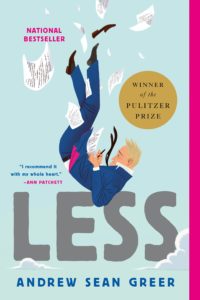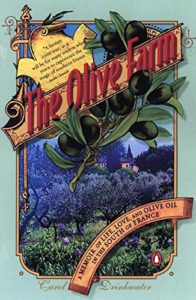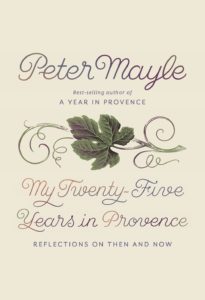Less by Andrew Sean Greer
I’ve decided I need to venture out of my safety zone and read more widely acclaimed books. You know, those books getting media attention, the runners-up, and the actual prize winners. Don’t get me wrong, I often read notable books and have reviewed them here – but the experiences are often checkered.
Less won the Pulitzer Prize for fiction in 2018
Here, all this time, Less thought he was merely a bad writer. A bad lover, a bad friend, a bad son. Apparently the condition is worse; he is bad at being himself.
One day Less receives a wedding invitation — his younger lover from his latest long term relationship is getting married to an equally younger man. He can’t go, he just can’t, so he books himself on a trip around the world. He goes through his stack of pleas for his attendance at various writers conferences, teaching assignments, interviews, publicity junkets and cobbles together an exotic itinerary. These are not big name events, but those offered to middle tier authors — many are unpaid, some will pay only his expenses. It matters not to Less, he can now legitimately reply to the wedding invitation saying he will be out of the country at the time of the dreaded wedding.
And so off we go with Less to Mexico, Morocco, Berlin, Japan, India – a sort of Eat Pray Love journey filled with typically uncomfortable ‘Lessian’ travails. (Side-note: Less believes he speaks fluent German and his translated conversations had me giggling out loud, knowing that’s how I must sound when I speak my long-studied-but-never-mastered French.)
There, I’ve told you about the basic plot of this slim novel, but wait — wait there’s so much more.
You may have to barrel through the first few chapters — this is where Mr. Greer’s writing feels a bit uneven and disconnected — I almost gave up, but happy I didn’t. By the time you (and Less) are in Morocco — the writing meshes and starts to soar.
The prose goes from being sharp and insightful ~~
“Strange to be almost fifty, no? I feel like I just understood how to be young.” “Yes! It’s like the last day in a foreign country. You finally figure out where to get coffee, and drinks, and a good steak. And then you have to leave. And you won’t ever be back.”
His brain sits before its cash register again, charging him for old shames as if he has not paid before.
~~ to poignant
How can so many things become a bore by middle age — philosophy, radicalism, and other fast foods — but heartbreak keeps its sting?
…the time when any couple has found its balance, and passion has quieted from its early scream, but gratitude is still abundant; what no one realizes are the golden years.”
~~ and this gets my nomination for best sentence ever:
He kisses—how do I explain it? Like someone in love. Like he has nothing to lose. Like someone who has just learned a foreign language and can use only the present tense and only the second person. Only now, only you.
Not gay, you say, well neither am I– but no matter who you are, you’ll recognize a little (or a lot) of Less in yourself. As he travels he tries to write but instead muses back his life, his loves, his mistakes – all the regrets. Mr. Greer, himself gay, has written a humorous yet gentle novel all about the all-too-human fear of aging, and discovering that middle-age can bring grace and even love.
I won’t give away the ending, but let it be said – I cried…
A digital review copy was kindly provided by Hachette Book Group via NetGalley
—————————————-
As much as I enjoyed Less, I wondered about this slim, comic novel’s qualifications to win the Pulitzer and did some research – turns out Pulitzer’s guidelines are amazingly loose.
The winning book, be it a novel or short-story collection, must have been written by an American, and should, ideally, be in some way about American life.
HERE’S a list of other Pulitzer prize winning fiction. Still not sure it ranks up there with some of the others I’ve read, but then again, no one asked me to be a judge.
And, as Less learns it’s pronounced PULL-it-sir, not PEW-lit-zer.
Once Upon a River by Diane Setterfield
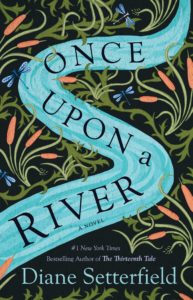 Once Upon A River
Once Upon A River
by Diane Setterfield
Ms. Setterfield’s The Thirteenth Tale is one of my all-time favorite novels – it holds a place of honor on my shelf, so I was excited to receive an advance reading copy of her newest novel, Once Upon A River.
What a journey I’ve been on, what a tale I’ve been told. Pull up a chair here by the fire and let me tell you more
It was solstice night, the longest night of the year… And as the borders between night and day stretch to their thinnest, so too do the borders between worlds… Unexpected things can happen. Did the solstice have anything to do with the strange events at the Swan? You will have to judge for yourself.
The novel opens on the winter solstice of 1887 at The Swan, a pub on the Thames River in England. The Swan is where drinking patrons gather to tell and hear stories. The stories are suddenly interrupted by the appearance of a badly injured stranger at the door, carrying a dead little girl. When the child, who had no signs of life, hours later begins to breathe again, everyone wonders who or what she is. A miracle? A river sprite? A magic being? Who is the injured man, not the father, but carrying the little girl? Whatever she may be, once revived, three different people claim her as their own lost little girl.
But in describing the basic premise, I am short shifting Once Upon a River. This is a rich and complex novel. A lyrical fairy tale steeped in the art of story telling and painted with its river setting symbolism. I was completely enveloped in this fascinatingly entwined story of the little girl, the mysterious injured man, the families, and the various patrons who witnessed the miracle. Like any good fairy tale, we’re never sure what’s myth or reality. A woman with an patch over an eye that has the power to see deep into people’s souls and there’s Quietly – the river’s mythical guardian who watches over all who cross or boat upon it.
Don’t be put off by the size of this novel – it’s a chunkster – but Ms. Setterfield has carefully woven the stories together so that you’re eager to visit with each character to hear their side of the story — their version of the history. The stories swirl along the river and back and forth in time. The river itself, the Thames, is not just a setting, it serves both as character and metaphor — the reader and the story follow its twists, ebbs and flows — straining to see what’s around the next bend…
It finds its way into wells and is drawn up to launder petticoats and be boiled for tea. It is sucked into root membranes, travels up cell by cell to the surface, is held in the leaves of watercress that find themselves in the soup bowls and on the cheeseboards of the county’s diners. From teapot or soup dish, it passes into mouths, irrigates complex internal biological networks that are worlds in themselves, before returning eventually to the earth via a chamber pot. Elsewhere the river water clings to the leaves of the willows that droop to touch its surface and then, when the sun comes up, a droplet appears to vanish into the air, where it travels invisibly and might join a cloud, a vast floating lake, until it falls again as rain. This is the unmappable journey of the Thames.
Admittedly, there are lots (and lots) of characters, but even this poor old brain was able to keep them straight – a testament to the writing. Ahhh, the writing – Ms. Setterfield is the master chef of storytelling — mixing folklore into a mystery and sprinkling in some magical happenings. I found it impossible to rush this novel — and fair warning, some may find it tedious — but not I. I deliberately slowed down my usual rapid reading to savor many beautiful sentences…such as this:
They were collectors of words the same way so many of the gravel diggers were collectors of fossils. They kept an ear constantly alert for them, the rare, the unusual, the unique
and this:
There are stories that may be told aloud, and stories that must be told in whispers, and there are stories that are never told at all.
Once Upon a River had me spellbound for days (and nights). Ms. Setterfield shows the import of stories to shape and define lives. How stories change the past, hide secrets, form resentments, teach us how to love and be loved — and in the end, to flourish as humans.
I’ll leave you with this from the ending (and a recommendation to also read The Thirteenth Tale):
And now, dear reader, the story is over. It is time for you to cross the bridge once more and return to the world you came from. This river, which is and is not the Thames, must continue flowing without you. You have haunted here long enough, and besides, you surely have rivers of your own to attend to?
A digital advanced readers copy was kindly provided by Atria Books via Netgalley.
Escape From Winter
Look out your window…is this your view?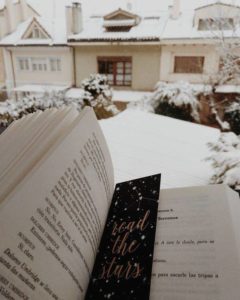
What if, instead, I could give you this view? Or this?
Here are three books certain to whisk you away to warmer climes ~~ perhaps not physically, but in your imagination.
So make yourself some cool lemonade and come with me, let’s escape winter for a bit.
The Olive Farm
A Memoir of Life, Love and Olive Oil in the South of France
by Carol Drinkwater
Carol Drinkwater is the actress best known for her portrayal of Helen Herriot in the BBC television series All Creatures Great and Small.
When Ms. Drinkwater and her fiancé (later husband) Michel, are given the opportunity to purchase ten acres of an abandoned olive farm in the South of France, they find the region’s splendor impossible to resist. Using their entire savings as a down payment, the couple embark on an adventure that brings them in contact with the beautiful countryside of Provence, its neighbors personalities, petty bureaucracies, bug infestations and unexpected wildlife. This warm and funny memoir takes the reader from the glamour of Cannes to the sunny charm of their small plot of land, which they back breakingly transform from overgrown weeds into a thriving olive farm producing some of the finest olive oil in Provence. While at times pedantic when it comes to the history of the olive and olive oil production — The Olive Farm will make wipe your brow in sympathy as they work their land and guaranteed you want to upgrade whatever mediocre olive oil lurks in your cupboard.
My Twenty-Five Years in Provence
Reflections on Then and Now
by Peter Mayle
You may remember my earlier post about Peter Mayle who died a year ago. Here is his final volume of essays – containing all new pieces which offer his warm and vivid recollections from twenty-five years in the South of France–lessons learned, culinary delights enjoyed, and changes observed.
Twenty-five years ago, Peter Mayle and his wife, Jennie, were rained out of a planned two weeks on the Côte d’Azur. In search of sunlight, they set off for Aix-en-Provence; enchanted by the world and life they found there, they soon decided to uproot their lives in England and settle in Provence. They never looked back and when Mr. Mayle’s books became bestsellers, the inspired a whole lot of Brits to follow in their footsteps.
In this volume, his 25 years in Provence have made him wiser and a bit cynical, but no less in love with the area. A cup of café might may now cost three euros–but that price still buys you a front-row seat to the charming and indelible parade of village life. After the coffee, you might drive to see a lavender field that has bloomed every year for centuries, or stroll through the ancient history that coexists alongside Marseille’s metropolitan bustle. Modern life may have seeped into sleepy Provence, but this volume reminds us that its magic remains.
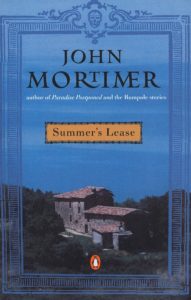 Summer’s Lease
Summer’s Lease
by John Mortimer
And now a novel. But not just any novel, a Book Barmy favorite I have re-read Summer’s Lease several times — usually in the midst of cold and damp weather.
Just to refresh your memory John Mortimer is the author of the famous Rumpole series which was adapted into a very fine BBC series ages ago.
With Summer’s Lease, Mr. Mortimer veers away from the dusty London chambers into far different surroundings – namely a hot summer in the Tuscany region of Italy.
So there you go some reading escape to take your mind off those endless layers of clothes, wet boots, and snow shoveling.
Holiday Reading
Despite a busy, happy, jam-packed holiday season, I was able to get in a few books. Nothing high brow, nothing earth shattering. A few lightweight holiday reads. Just the right ending for what turned out to be a super couple of weeks.
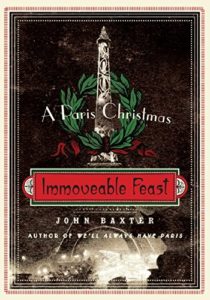 Immoveable Feast
Immoveable Feast
A Paris Christmas
by John Baxter
In this novel, John Baxter writes of preparing his first Christmas feast in France. Australian by birth, living in Los Angeles. He falls in love with a French woman:
“Struck down by that helpless love which the French call un coup de foudre – a thunderclap — I’d abandoned a comfortable life in Los Angeles and, on the spur of the moment moved to Paris to be with this woman I loved. I knew no more French than one can pick up from movie subtitles.”
It is now several years later and he has married Marie. This year he has the dubious honor to host the annual Christmas meal for friends and family. Each chapter takes the reader through his search for the perfect ingredients for his menu. There’s a whole chapter on sourcing fine French cheeses, and I swear you can smell and taste each cheese.
From traveling to India for spices, to discovering the perfect wine at a bargain price in a small village grocery — the pressure is on for our poor author. Mr. Baxter is funnily self deprecating, in awe of French style, and intimidated by their insistence on food perfection. As a frequent dinner host, I loved watching his meal plan come together and the last chapter, culminating in the meal itself, is guaranteed to make your mouth water.
I even cheered along with his guests as they erupted in very un-French-like applause over his flaming fruit dessert.
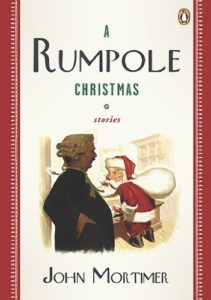 A Rumpole Christmas
A Rumpole Christmas
by John Mortimer
One of my great pleasures of the holiday season is to bring out and cozy-up with my favorite Christmas books. This collection of Rumpole stories is one such delight.
Back in the 1980’s Husband and I were fans of the BBC/PBS series Rumpole of the Bailey starring the inimitable Leo McKern. The series was based on the books and stories written by John Mortimer. (You can currently see many of the television episodes on YouTube.)
These stories feature cantankerous lawyer Horace Rumpole, his hapless colleagues at the Old Bailey and his formidable wife, Hilda (aka She Who Must Be Obeyed). These pieces variously appeared between 1997 and 2006 in various British publications, and I’ve since learned, are the only ones with a Christmas setting.
In Rumpole and Father Christmas, our barrister meets an old friend (of sorts) playing Father Christmas at the office holiday party. Meets him, that is, as he’s returning things he stole during the party.
One of the best of these stories is Rumpole’s Slimmed-Down Christmas. Rumpole’s wife, Hilda has booked them at a health farm during the holidays. Enduring yak-milk and a no alcohol policy, Rumpole finds distraction by defending the owner of the health farm against a charge of murder.
In the one story that always has me chuckling out loud, Hilda and Rumpole spend Christmas at Cherry Picker’s Hall. To Rumpole’s horror, Justice Graves (Rumpole calls him the old Gravestone) is also in attendance.
“His usually lugubrious features wore the sort of smile only previously stimulated by a long succession of guilty verdicts”
The Old Gravestone appears to find Hilda all too charming. Rumpole must endure not only dancing with Hilda, but the Old Gravestone’s attempts at flirting.
But, above all we have Rumpole himself, smoking his cheroots, swilling his cheap red wine, and always standing up for the defense. He quotes Worsdworth and Shakespeare — he is our favorite Curmudgeon Extraordinaire.
Mr Mortimer*, who died in 2009, made his career with the Rumpole series which are based on actual courtroom trials in England. He writes with great wit and, most admirably, injects subtle sarcasm into his writings. (Book Barmy note: I think many authors have difficulty writing sarcasm without seeming cruel. Mr. Mortimer is a writer who deftly crafts this fine balance.)
Rumpole’s Christmas stories never fail to delight.
* John Mortimer was a playwright, novelist, and former practicing barrister who wrote film scripts as well as stage, radio, and the Rumpole television series for which he received the British Academy Writer of the Year Award, along with his adaptation of Evelyn Waugh’s Brideshead Revisited. He is the author of twelve collections of Rumpole stories and three acclaimed volumes of autobiography. John Mortimer also wrote one of my favorite novels Summer’s Lease
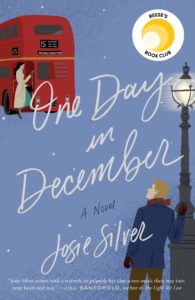 One Day in December
One Day in December
by Josie Silver
I was in the throes of a busy, yet fun, holiday and needed a lightweight read that didn’t require major brain cells.
One Day in December was a pure romantic Christmas delight. I don’t often read what is coined as “Chick-Lit” or “Rom-Com” but I was taken in by the publisher’s letter in my advanced reading copy. The letter claimed this new novel was a cross between Love Actually and When Harry Met Sally – and that it left a smile on her face for days after she finished. Okay, perfect, I decided.
It’s December and Laurel is packed on the upper deck of a London city bus and musing on her fellow passengers coughing and sneezing~~
“It’s a wonder everyone who uses public transport in winter doesn’t keel over and die of germ overload.”
Then Laurel catches the eye of a man waiting at a bus stop and their eyes lock in tandem and the world seems to disappear around them. Yes, corny, but seems it’s love at first sight. Neither can move fast enough to either get off the bus (Laurel) or the guy to run to get on the bus…so life goes on.
Eventually, their paths cross, but he (Jack) is dating her room mate and best friend, Sarah…awkward. Although Jack vividly remembers their bus sighting, and instantly feels the same connection — he decides not to acknowledge this to Laurel. And so the years go by.
Ms. Silver has constructed her novel into chapters which delve into each character’s point of view and then into yearly sections –each year ending with a wrenching December holiday plot twist. I can see a film adaptation in Ms. Silver’s future.
Far more complex and thankfully, not a typical romantic comedy, One Day in December was very nicely written and compelling. The British characters are lovably flawed — the author has them stumble through friendships, breakups, dreams, jobs and finally love. They drink too much, love too much, mess up their relationships — and I found it all quite endearing.
Great literature? No.
A cheerful and heartwarming romantic comedy? Yes.
Me. Hopeless romantic? Definitely.
Now I’ve got to go. It’s New Years Day evening. Husband has had enough football and has relinquished the television. I’m off to watch Love Actually one last time. Back to real life tomorrow Okay?
Happy New Year. 
A digital advance readers copy of One Day in December was kindly provided by Broadway Books via NetGalley.
It’s Here!
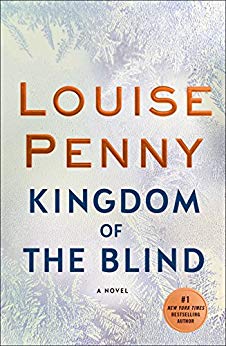 Today’s the day – it’s finally here. As in previous years, I advised you to cancel your appointments, call in sick to work and to be at your local bookstore first thing this morning to buy the newest Louise Penny book — Kingdom of the Blind.
Today’s the day – it’s finally here. As in previous years, I advised you to cancel your appointments, call in sick to work and to be at your local bookstore first thing this morning to buy the newest Louise Penny book — Kingdom of the Blind.
Didn’t do any of that? Oh well, you’ll just have to swing by your bookstore on your way home.
Let me tell you why I’m being so bossy insistent about this.
Ms. Penny is a mystery writer with a trio of talents – not seen in very many mystery series writers.
First, she has keen sense of humans, their frailties, their emotions, their kindnesses and their dreadfulness. Her characters are multi-dimensional and fully realized. Second, Ms. Penny creates an all enveloping sense of place – her settings are always fall-into-the-page realistic — from the cozy bistro in Three Pines to the dirty, drug infested back streets of Montreal. Combine this with her page-turning, yet complex multi-layered, mysteries, and well you’ve got one of the best mystery series being published.
While you can read any of her novels as a standalone, I do suggest you try and read them in order as some of the story lines do carry into the next and the characters become more developed and evolved. You can see her whole series of books in order on her website – HERE
Kingdom of the Blind picks up a few months after the last book (Glass Houses). Armand Gamache was suspended as head of the Sûreté du Québec having deliberately allowed some seized opioids to slip though his hands in order stop an insidious street drug operation. Amelia Choquet, one of his cadets has just been kicked out of the police academy due to her own drug use and is now thrust back onto to the seedy, drug infested back streets of Montreal. A coincidence? We wonder…
Meanwhile, wintry Three Pines remains the idyllic oasis for its residents and friends. But they have lost power and are buried in snow:
Reine-Marie, at the bistro:
Why do we live here? Oh heaven…do you have power?
Non. A generator.
Hooked up to the espresso machine?
And the oven and fridge, said Gabri.
But not the lights?
Priorities, said Olivier. Are you complaining?
Mon Dieu, no, she said.
Comfort foods that rarely fail in their one great task are abundant.
Gamache, psychologist and bookseller Myrna Landers, and a young builder have been called to an abandoned farmhouse just outside Three Pines to meet with a notary. Once there, they find out they have been named the liquidators (executors) of a mysterious woman’s will. The three adult children, who are the beneficiaries, have no idea why their mother chose these three unknown people to oversee her will. It turns out there is more to the story than anyone thought — a family story of a lost European inheritance dating back hundreds of years, embezzlement, and murder.
Ms. Penny is a master of plotting and just when you think you know where she’s going (and if you’re like me, you dumbly believe you have it figured out) the plot twists in an unexpected direction. This had me flipping pages as fast as I could read, and yet I made myself slow down to savor the writing.
All Ms. Penny’s novels have a theme woven into her mysteries and this one is about blindness or our blind spots. How humans see what they want to see. Masterfully we are given insights into what at first seemed one thing and is reveled to be something else entirely. A drug wasted transvestite has goodness underneath. A beloved godfather has a nasty streak. A trusted financial advisor should, or should not, be trusted.
Don’t worry devoted Ms. Penny fans, the cast of characters is still there from Three Pines and there’s a smattering of Ruth chuckles — but this installment is especially focused on Gamache and his second in command (and now son-in-law) Beauvoir. Both are contemplative and confronting major decisions that will inspire life changing events. One of which is revealed in the last chapter and will have you wanting whatever is up next in this wonderful series.
I’m going to leave it here, no spoilers and I’m really at a loss to review The Kingdom of the Blind in the fashion it deserves, so I will quote one of my favorite professional reviewers, Maureen Corrigan:
Any plot summary of Penny’s novels inevitably falls short of conveying the dark magic of this series. No other writer, no matter what genre they work in, writes like Penny.
Kingdom of the Blind – don’t say no — just buy it.
Many (many) thanks to Minotaur Books for providing an Advanced Readers Copy.
The Little Stranger by Sarah Waters
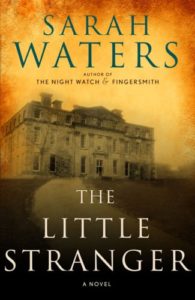 The Little Stranger was a deliciously creepy Halloween read which kept me up well into several October nights — but I’m only now getting around to this review. Pretend it’s Halloween, which was only a few weeks ago.
The Little Stranger was a deliciously creepy Halloween read which kept me up well into several October nights — but I’m only now getting around to this review. Pretend it’s Halloween, which was only a few weeks ago.
It’s post-war Warwickshire, England and Dr. Faraday has been called to Hundreds Hall, the Ayres family mansion. The doctor was here before, as a child, accompanying his mother, a housemaid for the family. As a child he was entranced with the hall’s decorative wall panels and he secretly pried loose and pocketed a carved walnut.
Now it’s thirty years later and Hundreds Hall has lost former grandeur. In amongst leaky ceilings and musty carpets lives the Ayres family: Mrs. Ayres, a widow who longs for the old days of her family glory; her son, Roderick, a veteran who is still suffering both physically and mentally from the war, and his sister, Caroline, a young woman who desires a life of her own.
But the most important character is Hundreds Hall — the author spends pages (and pages) describing the crumbling and dilapidated mansion. This provides an eerie backdrop for presenting a family tormented by the past.
[When] I stepped into the hall the cheerlessness of it struck me at once. Some of the bulbs in the wall-lights had blown, and the staircase climbed into shadows. A few ancient radiators were bubbling and ticking away, but their heat was lost as soon as it rose. I went along the marble-floored passage and found the family gathered in the little parlour, their chairs drawn right up to the hearth in their efforts to keep warm.
The Ayres are stuck between the pre-war world and the post war one. But, as we discover, they are also stuck between this world and one inhabited by spirits and secrets.
Yes, the house is haunted — mysterious writing appears on the walls, there are unexplained small fires, unexpectedly locked rooms, and creepy noises through the antiquated pipes. Roderick succumbs to his demons (and the house’s) and is sent away to an institution. Carolyn struggles to maintain some sense of normalcy in the highly abnormal Hundreds Hall and Mrs. Ayres begins to go mad.
At the center is Dr. Faraday, attending each family member as best he can but also striving to get to the bottom of the frightening incidents at Hundreds Hall. Despite his lower class upbringing, Dr. Faraday not only becomes the family doctor, but also a trusted friend, and eventually, Caroline’s fiancée.
The prose beautifully builds a chilling atmosphere and a looming sense of dread. More eerie than scary. Slow and languid but at the same time, exciting and suspenseful. Although the novel could have benefited from some major editing, I was totally invested — reading on and on, even when I got slightly spooked — hearing things go bump in the night.
Some readers said there is no resolution – no ending. However, by re-reading several key scenes and the last few pages — I figured out who is the little stranger and had goosebumps along the way.
The Little Stranger is not at all like some of today’s merely adequately written thrillers, whose readers only require a ‘page turner’. This novel is slow, subtle, literate and requires a little more thought — a thinking reader’s thriller.
Once again, they’ve made a film from a book I’ve just read. It looks properly creepy and atmospheric.
Trailer HERE


